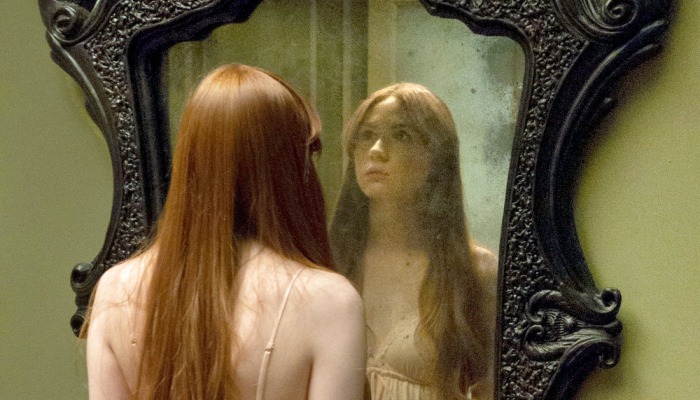 (3 / 5)
(3 / 5)
All families, no matter how idyllic, are haunted.
We are all scarred by our experiences, growing up, as adults, however superficially: what we hear – our parents arguing in their bedroom – what we or don’t see – the monster at the foot of the bed.
For the family in Oculus, their unhappiness takes the form of an ornate, Gothic mirror, which once hung on the wall at Balmoral Castle. It’s not long after moving into their new home and the acquirement of said antique that the Russell’s home life goes to hell. The distracted but affectionate Alan (Rory Cochrane) finds himself visited by a specter from the glass, a woman with mirrored eyes. His high-strung wife, Marie (Battlestar Galactica’s Katee Sackhoff), is plagued by visions and paranoia.
Eleven years on from their parents going full Jack Nicholson, Tim Russell (Brenton Thwaites) is released from a psychiatric hospital, apparently cured of his “delusions”. His tenacious sister, Kaylie (Karen Gillan), however, is still obsessed with proving the mirror’s innate evil and clearing their parent’s names. As such, she’s arranged for them to spend the night at the old family home and take on the accursed looking glass at its own game. She’s even installed a literal kill switch – just in case.
In this regard, Oculus is similar to The Conjuring from last year – which concerned a cursed doll – but, unlike James Wans’ earlier effort, Mike Flanagan’s film mostly keeps a lid on its ghosts. Though the nature of their ailment would seem to be supernatural, Oculus is careful never to stray into the realms of phantasmagoria. Aside from a few random phenomena – plants die in the mirror’s vicinity, family pets disappear – everything that goes on can be attributed to not-so-common-or-garden psychosis.
The film exactingly parallels Tim and Kaylie’s experiences in the present with the traumas they underwent as children (played here by Garrett Ryan and Annalise Basso). As reality breaks down around them, the back and forth between the two suggests that – despite his certified sanity and her new found sophistication – Tim and Kaylie are just as susceptible to manipulation as when they were children, be it supernatural or otherwise. Even Kaylie’s scientific method falls apart in the face of it.
Thwaites is a level headed force of rationality opposed to Kaylie’s grim determination – Gillan’s ability to capture unwavering bravery, first displayed in Doctor Who, gets a strong outing here. Its unsettling atmosphere augmented by some truly cringe-worthy, self-inflicted body horror, Oculus uses dread and horror to tell a story of trauma. One minute as children hiding in the bathroom, the next as adults battling an unknown force, the film suggests that trauma is not severance but a connection.
Oculus shows the barrier breaking down between then and now as lights flicker and specters creep. As the mirror’s long and violent history repeatedly illustrates, all of this can happen again as long as we hold onto the things that haunt us.
